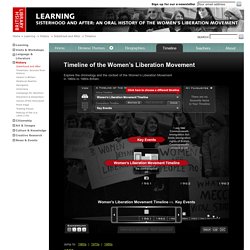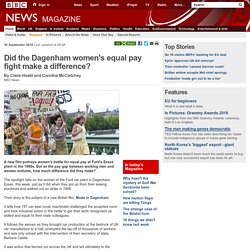

Explicit cookie consent. Timeline of the Women’s Liberation Movement. Explore the chronology and the context of the Women’s Liberation Movement in 1960s to 1980s Britain.

Jump to: 1960s | 1970s | 1980s 1960s 1961 - Introduction of the contraceptive pill 4 December 1961 The contraceptive pill was launched in 1961. The contraceptive pill was launched in 1961. You can find out more about contraception and reproductive rights in Sex, Sexuality, Love and Friendship and Activism. Read more about 'Introduction of the contraceptive pill' 1964 - Married Women's Property Act revision 25 March 1964 The Married Women's Property Act was first introduced in 1870. The Married Women's Property Act was first introduced in 1870. You can find out more about the impact of the Act and other legislation relating to marriage in Family and Children. Read more about 'Married Women's Property Act revision' 1967 - Abortion Act 27 October 1967 The 1967 Act legalised abortion in the UK, for women who were up to 24 weeks pregnant.
Read more about 'Abortion Act' 7 June 1968 6 April 1968 17 April 1969. What Germaine Greer and The Female Eunuch mean to me. Helen Lewis, deputy editor of the New Statesman Germaine Greer is feminism's arsonist.

Unlike with, say, Andrea Dworkin or Kimberlé Crenshaw, there isn't one particular topic or theory she will always be associated with. Her value to feminism is as a destructive force, tearing down stereotypes and smashing taboos. She is living testament to the idea that women don't have to do what has always been expected of them: be good girls, get married, have kids, be nice and shut up. As a public intellectual, she had self-confidence you could bounce rocks off.
It has become fashionable to affect a faint embarrassment about Greer, like a batty great aunt who sits in the corner making disquieting remarks about the Germans. The 1970s needed a feminist like that. Today's feminists shouldn't airbrush her legacy into something we find more palatable – particularly when the movement still so often demands that its pioneers also be saints.
Rosie Boycott, journalist and campaigner. Dagenham sewing machinists recall strike that changed women's lives. For Vera Sime, a former sewing machinist at Ford's Dagenham plant in the 1960s, one of the epochal days in modern industrial history started like any other.

"It was like a normal work day in that I got the children ready and gave them to my sister. Then we all met at the factory and got on the coach. " Along with scores of female colleagues infuriated by a pay structure that blatantly favoured male workers, Vera travelled to the streets of Whitehall on 28 June 1968 where employees brandished a famous banner. It read: "We want sex". Twenty-first century prejudices make it tempting to jump to conclusions about that image, but these were hardly women playing up to some hackneyed Essex stereotype. A mammoth meeting that day between eight strike leaders and Barbara Castle, who was then employment secretary, brokered a deal to end their three-week strike, which resulted in the women agreeing to return to work and the conception of the 1970 Equal Pay Act.
Ford management was apoplectic. Did the Dagenham women's equal pay fight make a difference? 30 September 2010Last updated at 05:45 By Claire Heald and Caroline McClatchey BBC News A new film portrays women's battle for equal pay at Ford's Essex plant in the 1960s.

But as the pay gap between working men and women endures, how much difference did they make? The spotlight falls on the women of the Ford car plant in Dagenham, Essex, this week, just as it did when they got up from their sewing machines and walked out on strike in 1968. Their story is the subject of a new British film, Made in Dagenham. It tells how 187 car-seat cover machinists challenged the accepted norm and took industrial action in the battle to get their work recognised as skilled and equal to their male colleagues.
It follows the women as they brought car production at the bedrock of UK car manufacture to a halt, prompted the lay-off of thousands of workers and was only solved with the intervention of then secretary of state, Barbara Castle. 'No bra-burning' "We didn't burn our bras on the way," says Eileen.